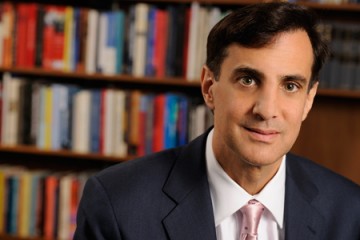A day before a U.S. Senate Appropriations Committee hearing in which heads of the nation's major research agencies will jointly testify on the need for federal research investments to drive innovation and economic growth, a group of 50 leading business, higher education, scientific, and patient organizations urged members of that panel to make strong, sustained investments in research in order to close what they call an "innovation deficit."
In written testimony submitted to the Senate committee, the coalition—which includes Johns Hopkins University President Ronald J. Daniels and Ralph Semmel, director of the Johns Hopkins University Applied Physics Laboratory—described the links between basic research and economic growth, improved medical treatments, and national security. They noted that lagging U.S. investment in research and higher education combined with the significant increase in such investment by other nations has created an innovation deficit, threatening the nation's international competitiveness.
"As the global innovation leader, we produce more discoveries and patents, and more technological and health advances than any other nation," the join statement said. "Economists have made very clear that these science- and engineering-driven advances have fueled most of our nation's economic growth in the decades since World War II. Yet today, our leadership faces a serious challenge from other nations that are rapidly increasing their investments in these critical areas while our own spending lags."
In his written testimony, Daniels noted that "the NIH has lost more than 20 percent of its purchasing power since 2003, leading to the elimination of about two thousand research projects each year. This has had a direct impact on Johns Hopkins and the work we do, in the form of shelved research, terminated jobs, and lost opportunities for educating and training the next generation of innovators. We estimated last year that the sequester would reduce our non-defense research efforts by more than $70 million dollars. And of course, this impact is not confined to Johns Hopkins."
He added: "The potential impact on our young scientists is grave—without the funding to launch their own research in the United States, our young scientists are discouraged. They are turning elsewhere, pursuing positions outside of academic research, outside of the country, even outside of science entirely."
Senate Appropriations Committee Chair Barbara Mikulski said she called for tomorrow's hearing, titled, "Driving Innovation through Federal Investments," because she wants to make certain that in dealing with America's budget deficit, we don't create an American innovation deficit. Witnesses at the hearing will include John P. Holdren, Director, Office of Science and Technology Policy, Executive Office of the President of the United States; Ernest Moniz, Secretary, U.S. Department of Energy; Francis S. Collins, Director, National Institutes of Health; France A. Córdova, Director, National Science Foundation; and Arati Prabhakar, Director, Defense Advanced Research Projects Agency, Department of Defense (DARPA).
"We firmly believe that sustained federal investments in science and technology are vital to our national security, our economic prosperity, and the future of our nation," Semmel wrote in his testimony. "Federal investments in science and technology created the systems that ensure our nation's security today; they fuel the scientific discoveries and innovations that will serve our society and drive our economy tomorrow; and they create the marketplace that employs the American scientists and engineers who are vital to our nation's future."
To learn more, and to view statements submitted in advance, visit appropriations.senate.gov.
Posted in University News, Voices+Opinion










